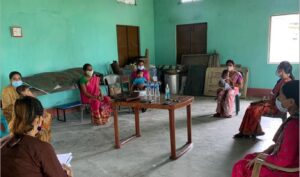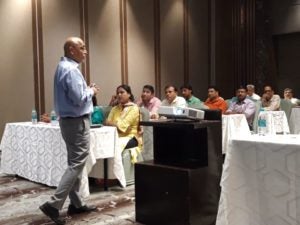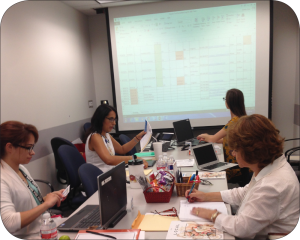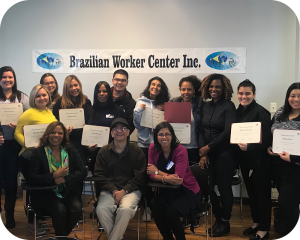LifeFirst SWASTH
Developed in partnership with Narotam Sekhsaria Foundation (NSF) in Mumbai, Boston University School of Public Health, and technology company Dimagi, the project objective is to adapt and evaluate a brief advice tobacco cessation program in high-reach settings in India with an emphasis on health equity. SWASTH, a Hindi word meaning “healthy,” stands for “Supporting Wellbeing among Adults by Stopping Tobacco Habit.” The three study aims are:
-
- Adapt and pilot-test an evidence-based brief advice program in Non-governmental organization (NGO)-run health centers, Tuberculosis (TB) clinics, and dental clinics.
- Conduct a cluster randomized control trial to assess whether the program results in increased cessation rates among tobacco users (compared to usual care) in three types of healthcare settings in Mumbai. Part of the strategy is to use a task-shifting approach (moving program delivery responsibilities from clinicians to community health practitioners).
- Evaluate the use of communication technologies, such as social media and apps, to support ongoing training and networking among community practitioners.
The study will evaluate the effectiveness of the program and also explore implementation processes. The long-term goal is to support the adaptation and scale-up of evidence-based programs from high-resource to low-resource settings.
Dr. Shoba Ramanadhan is Co-PI.
Funding: National Cancer Institute
Social and Behavior Change Communications (SBCC) strategies to advance POSHAN Abhiyaan
 Developed at the request of the Ministry of Women and Child Development (MoWCD), Government of India, this research project aims to document and evaluate “promising practices” for Social and Behavioural Change Communications (SBCC) to promote Jan Andolan (mass mobilization) to advance the National Nutrition Mission (POSHAN Abhiyaan).
Developed at the request of the Ministry of Women and Child Development (MoWCD), Government of India, this research project aims to document and evaluate “promising practices” for Social and Behavioural Change Communications (SBCC) to promote Jan Andolan (mass mobilization) to advance the National Nutrition Mission (POSHAN Abhiyaan).
The project aims to delineate current SBCC strategies, that are being used to promote nutrition seeking behaviours within the communities, identify ‘promising practices’ for Jan Andolan that are geographically and culturally proximal to people and disseminate the best strategies for context specific mass mobilization including effective media, channels and strategic messaging that can be used to scale and promote Jan Andolan.
Funding: Bill & Melinda Gates Foundation
Impact of Communications on Adolescent Health and Well-Being in Mumbai: A Longitudinal Study
The Salaam Bombay Foundation (SBF) is a non-profit organization in India that works with Indian youth to deliver interventions that focus on tobacco prevention, healthy behaviors, skill-building, and wellbeing. The Viswanath Lab, in partnership with SBF, developed and is conducting a longitudinal study to determine the impact of communications on adolescent health and well-being.
The aims of this study are:
-
- To conduct a longitudinal study involving school children in Mumbai, India, to measure key variables including personal and social assets; resilience; life skills; and health behaviors.
- To determine how key characteristics such as health communication behaviors, availability of assets, and resilience are associated with health, and to determine if these associations change over time.
- To compare changes in outcomes over time between students from schools who participated in SBF intervention programs to students from schools who did not receive SBF interventions.
- To determine the impact of SBF intervention dose on health and wellbeing over time among those who received SBF interventions.
UMass Boston- Dana-Farber/ Harvard Cancer Center (DF/HCC) Partnership
The UMass Boston – DF/HCC Partnership is a joint research collaboration addressing cancer disparities. The Partnership aims to improve research, training and outreach opportunities for under-represented minority trainees as well as develop information and resources to close the cancer disparities gap. Funded through the Center to Reduce Cancer Health Disparities at the National Cancer Institute, the Partnership promotes cancer disparities research by implementing and supporting:
- Transdisciplinary cancer science and cancer disparities research from cells to society;
- Research education;
- Outreach through knowledge translation;
- Access to research resources;
- Research infrastructure; and
- Sustainability.
Funding: National Cancer Institute
UMass Boston- Dana-Farber/ Harvard Cancer Center (DF/HCC) Partnership Outreach Core
A part of the UMass Boston – DF/HCC Partnership, the Outreach Core uses a community-engaged approach and is led by faculty and staff from UMass Boston and DF/HCC, in collaboration with a Community Advisory Board. It works in the Greater Boston and Lawrence areas to build capacity in community-based organizations (CBOs) and faith-based organizations (FBOs) for using evidence-based programs and strategies for health promotion. Its goals are to:
- Connect researchers, community members, CBOs, FBOs, and UMass Boston students
- Provide training and technical support to help CBOs and FBOs deliver evidence-based prevention programs and activities
- Train under-represented minority students from UMass Boston in outreach and community-engaged research
- Help place student trainees/interns in CBOs and FBOs
- Make research results accessible to community partners
- Participate in NCI National Outreach Network activities
Funding: National Cancer Institute
 Building Public Agenda and Policy Support for Public Health (Project SANCHAR)
Building Public Agenda and Policy Support for Public Health (Project SANCHAR)
Public and policy agendas on public health should be informed by evidence. However, the translation of research evidence to public and policy arenas is deterred by a lack of support for upstream public health policy among the general public, and by challenges accessing and using evidence among public health practitioners, decision makers, and reporters. In this project, we are working to enhance capacity among public health professionals, decision makers, and news media to incorporate the latest scientific evidence in their day-to-day practice.
Our program, focused on reproductive, maternal, newborn, child health, and adolescent health (RMNCH+A) and nutrition, has three key features: (a) training to build capacity for integrating and communicating evidence in daily practice, (b) technical consultancy to facilitate adoption in practice, and (c) summits and roundtables to identify priorities and promote evidence-informed decision making to address public health problems. By designing and implementing a set of activities around these three features, we hope to have far-reaching influence in promoting evidence-based public health practice, decision making, and media coverage.
Funding: Bill & Melinda Gates Foundation
Accelerating Adoption of Responsive Practices in Health Programming
This joint effort with M&C Saatchi World Services (an advertising agency) and Dimagi (digital health specialists) supports health sector organizations in gathering feedback to continuously improve their strategies and interventions. Specifically, we collaborate with organizations working in low- and middle-income countries, helping them develop rapid feedback systems that encourage experimentation and optimization, and supporting them in analyzing and applying their feedback data. This will lead to continuous improvement of interventions and greater impact in health programming.
Funding: Bill & Melinda Gates Foundation
Past Projects
 Project SNAP
Project SNAP
Created in partnership with the University of Saskatchewan and Baylor College of Medicine, Project SNAP used innovative smartphone-based methods to study real-time environmental exposure to tobacco messages. The study had two aims:
- Measure exposure to tobacco messages in a real-world setting
- Test the feasibility of using smartphones to gather message exposure data among a population from low socioeconomic position
The study gathered a rich body of information, including the frequency or content of pro- and anti-tobacco messages, receptivity to these messages, tobacco-related information seeking, quit attempts, GPS location where messages were reported, and smoking behaviors and attitudes.
Funding: Truth Initiative
Harvard Culture of Health Leadership Qualities Project
In this joint project with the Harvard Business School, we are examining how business leaders promote a “culture of health” in the areas of employee, environment, consumer, and community health. The study consists of in-depth individual interviews with a diverse group of leaders, all of whom go beyond employee wellness campaigns and philanthropic efforts to actively promote a broad view of health and well-being in their organizations. Our overall goal is to influence the ways in which corporate leaders can use their influence to improve the health of the public.
Funding: Robert Wood Johnson Foundation
Center for Social and Behavior Change Communications at Ashoka University
This project supports the development of a world-class Center for Social and Behavior Change Communications (CSBCC) based at Ashoka University in India. The CSBCC will research, develop, and test communication interventions in collaboration with national and state governments, international and Indian donors, professional bodies, commercial providers, and civil society organizations, to address barriers to social and behavior change impacting the poor. The Viswanath Lab will partner with CSBCC on building research and evidence for social and behavior change. Key topic areas may include sanitation, maternal and child health, immunization, nutrition, financial services, and agriculture. The translational research of the CSBCC will strive to inform communication needs of the poor, produce prototypes, build capacity among program and policymakers working with the poor, disseminate evidence-based material using information and communications technology tools, and monitor outcomes attributable to the Center’s work.
Funding: Bill & Melinda Gates Foundation
 Massachusetts Health Information National Trends Survey
Massachusetts Health Information National Trends Survey
The objective of this study was to build on the National Cancer Institute’s Health Information National Trends Survey (HINTS) to collect data relevant to cancer control from individuals across the state of Massachusetts. The aims of the study were two-fold: 1) to conduct an internet-based survey of a sample of approximately 1,000 Massachusetts residents across the state, with an oversample of rural residents, and 2) to conduct supplementary, in-person data collection among 500 individuals from subgroups that are generally under-represented in surveillance efforts, including the homeless population, African Americans, Hispanics, people of lower socioeconomic position (SEP), and blue-collar workers. Survey items included validated measures from HINTS on subjects such as health status, cancer screening behaviors, cancer knowledge, and healthcare access and use. Additionally, participants received a module on psychological wellbeing or health technology use. Data for this project were collected in Summer 2017. They will inform the cancer control efforts for regional and local cancer centers and will provide valuable information on the cancer communication and screening behaviors of different population sub-groups across the state.
Funding: National Cancer Institute


You must be logged in to post a comment.